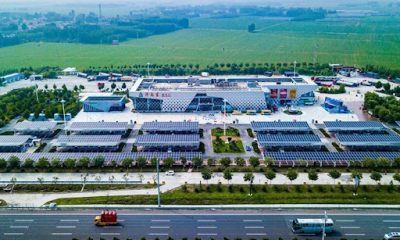News
China makes progress in development of “plant factories”
By Chang Qin, People’s Daily
It’s freezing cold outside in winter, but inside a “plant factory” of an agricultural tech firm in Beijing, it’s as warm as spring.
The “plant factory,” which covers 100,000 square meters, looks just like a technology-based “tomato forest” where 39 varieties of tomatoes are grown. The fresh tomatoes produced in the factory are welcomed by the market.
The factory has its environment controlled by digital platforms and comes with a water-fertilizer irrigation system. It is a nonstop vegetable-growing operation.
Plant factory is an efficient way of agricultural production realized via high-precision environmental control that offers appropriate lighting, temperature and nutrition needed by the growth of plants. The factory-like facility enables all-year-round production of crops.
China, though a latecomer in the area, has witnessed rapid development in key technologies and commercialization of plant factories. It has become a major player in the industry and is home to 250 commercial plant factories.
Besides, the country is a world leader in the field of energy conservation in the industry. The promotion and utilization of energy-saving LED lights, nutrient solutions, intelligent management and other technologies have laid a solid foundation for the rapid development of plant factories.
Plant factory, combining biological technologies, engineering technologies and system management, enjoys abundant advantages and generates multifaceted benefits.
It needs no soil or sunlight, and grows food anytime and anywhere. Through intelligent regulation, it significantly reduces the growth period and multiplies the production of crops. Besides, it features a soilless culture that is clean, safe and pollution-free.
Plant factories expand the function of urban agriculture and also can be built on uncultivated areas such as deserts and saline-alkali land. They help relieve China’s pressure from insufficient agricultural resources and play an important role in promoting agricultural efficiency and increasing farmers’ income.
The industry enjoys bright prospects, but also faces a bottleneck that needs to be shattered – high operational costs caused by big energy consumption.
China is currently working to lower the energy consumption in artificial lighting and air conditioning systems and to achieve intelligent management of plant factories, aiming to further promote research and industrialization of the sector and build a production system that’s low-carbon, smart and efficient.
China is a populous country with relatively scarce land and water resources. Its per capita area of arable land and freshwater resources stand at around 1/3 and 1/4 of the world average, respectively. Therefore, it is necessary to conserve resources and improve resource utilization.
China’s agricultural industrialization level continues to improve, and its first, secondary and tertiary industries highly integrate. New models of agricultural production are emerging, which are less seasonal and more geographically diverse.
Compared with traditional agriculture, plant factory, a type of modern facility agriculture, has overcome deficiencies such as high reliance on weather and weak disaster resistance. Relying on modern facilities and technologies that create a desirable environment, plant factory realizes high utilization of resources and is an important method to build resource-saving and environmentally friendly agriculture.
Facility agriculture experienced rapid development in China over the past four decades. The facility horticulture sector alone has reported an output of over 1.4 trillion yuan ($205 billion), accounting for over 2/5 of the total horticultural output and over a quarter of the agricultural output of China. Its economic benefit is more than 20 times that of field crops and more than four times that of open-field horticulture crops.
The facility horticulture sector has saved over 30 million mu (2 million hectares) of quality land. Besides, water consumption by facility vegetable farming is less than half of that by traditional vegetable farming, and 10-million-mu unheated solar greenhouses can save coal consumption by more than 250 million tons each year.
Technology has become a main trend today to assist and vitalize modern agriculture. From developing plant factories and vertical farms to promoting modern cold-arid agriculture, Gobi agriculture and marine farms, China is advancing the three-dimensional utilization of space and constantly expanding agriculture production. It is believed that the continuous development of facility agriculture will inject a stronger impetus into China’s modern agriculture.
News
TCN Acknowledges 7th Grid Collapse in 2024

The Transmission Company of Nigeria (TCN) has reported its seventh partial grid collapse in 2024. Despite the recurring issue, TCN’s General Manager of Public Affairs, Ndidi Mbah, reassured the public that efforts to restore power are well underway, with about 90% of substations receiving bulk power.
Mbah noted that the Azura Power Station initiated the grid recovery, although a minor setback occurred. However, power supply has been restored to the Abuja region and other key distribution centers. The Ibom Gas Generating Station remained unaffected, continuing to supply power to the South-South region.
An investigation into the cause of the collapse will commence once full grid restoration is achieved.
News
Jigawa Tanker Tragedy: Shettima, First Lady Mourn Victims, Pledge Federal Support

Vice President Kashim Shettima has expressed deep sorrow over the tragic tanker explosion in Jigawa State, which claimed over 100 lives. In a statement issued by his media aide, Stanley Nkwocha, Shettima, on behalf of President Bola Tinubu, extended condolences to the affected families, praying for strength and comfort in their time of grief.
Shettima assured the public that the federal government is mobilizing resources to support the injured and assist those affected. He has directed the immediate deployment of the National Emergency Management Agency (NEMA) to provide aid. The Vice President also stressed the need for a review of fuel transportation safety protocols to prevent future incidents.
In a separate statement, First Lady Oluremi Tinubu offered her condolences to Jigawa Governor Umar Namadi and the people of Jigawa, praying for peace and comfort for the families affected. She called the incident “unfortunate” and extended prayers for the recovery of the injured and the repose of the souls lost in the tragedy.
News
Nigeria Customs Intercepts Arms, Ammunition Worth N9.5bn Over Six Years

The Nigeria Customs Service (NCS) has revealed that it intercepted a total of 10,598 pieces of arms and 114,929 rounds of ammunition valued at N9.58 billion over the past six years. Comptroller General of Customs, Bashir Adewale Adeniyi, made this disclosure during a press conference on enforcement activities in Zone A.
Adeniyi highlighted that 60% of these seizures occurred in 2023, reflecting the Customs’ increased efforts to curb arms smuggling. He also mentioned that recent operations such as Operation Whirlwind and Operation Swift Sting are part of a strategic response to tackle evolving smuggling tactics.
In addition to arms seizures, the Customs CG announced the largest pangolin scale seizure since 2020, with 9,493 kg of scales confiscated in collaboration with the Wildlife Justice Commission. The joint operation led to four arrests across Kano, Kaduna, and Lagos. The NCS continues to intensify efforts against wildlife trafficking, targeting supply routes in northern Nigeria and border areas.
-

 Business14 hours ago
Business14 hours agoOkpella Monarch: Obaseki Ratified Kingmakers Decision, End 5years leadership Vacuum
-

 Banking11 hours ago
Banking11 hours agoFree Food Saga: Akpabio quoted out of context-CSO
-

 Foreign15 hours ago
Foreign15 hours agoSci-tech innovation fuels China’s high-quality development
-

 Entertainment7 hours ago
Entertainment7 hours agoDavido Declares ‘Timeless’ His Best Album
-

 Entertainment7 hours ago
Entertainment7 hours ago‘Adire’ Secures Four Nominations at the Best of Nollywood Awards
-

 Business7 hours ago
Business7 hours agoWike Urges Nigerians to Pay Taxes for Improved Social Services
-

 Foreign9 hours ago
Foreign9 hours agoQinling Mountains better safeguarded with comprehensive digital platform
-

 Foreign9 hours ago
Foreign9 hours agoExpressway service station in Shandong achieves carbon neutrality






